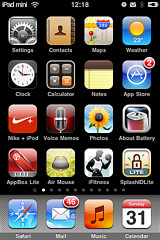Some things never change — for example, my aversion to our home phone ringing at any time of day. It’s true, I cringe and sigh in total exasperation every single time the phone rings. I don’t mind the blinking on the answering machine at all (because “YES! I MISSED a call! Great!) But when the phone rings, it interrupts my time at home, and it consistently annoys me, and has for years. (My husband is equally and consistently annoyed by my phone aversion, and has appointed himself at various times my “Scheduler” or my “Apologist”.)
On the other hand, I absolutely adore receiving text messages. I constantly check my phone for them. I much prefer to spend 30 minutes typing out limited messages in silence to a recipient of choice, rather than speaking on the phone with someone who has a convenient moment to interrupt me. I happily communicate with my children and friends this way. The Wall Street Journal published a recent article on this condition called “Y U Luv Texts, H8 Calls”. I can relate.
I am neutral about e-mail. I suppose it’s because it’s silent, is in written form, and I can craft my responses at will. (This is not the case for many — I work and live with un-named people who view their e-mail boxes as a great source of stress — and often announce how many messages are in their mailbox, like it’s a barometer of their influence, career commitment or success/failure level. I have no such e-mail baggage.)
However, I have noticed over the past year I’ve developed the habit of frequently checking my phone for breaking news, sports scores, Facebook status updates, new tweets, text messages, e-mails, really — anything and everything. I check and re-check my phone for updates on my own life. I watch television, and my phone is with me, so I can check it (but not to answer it.) Yes, I sleep with it next to the bed, so I can check it when I have insomnia.
My cell phone has killed my ability to read a book. I can’t keep my attention on page after page of a slowly unfolding journey no matter how exciting or poetic the prose. I can’t do it — unless I’m on an extended vacation. My phone sits on the nightstand on top of five or six books I’ve started and haven’t finished.
So now I have become the quintessential “target audience” of my marketing and PR peers: If you don’t grab my attention within the first 25 characters, or 3 seconds, I’m gone. You missed me. But it is ME who is missing. My shortened attention span has dulled my sensory intake and perception of what’s important, the subtle developments of life that a focused and patient person sees and contemplates. Sadly, I have observed this lack of focus and smartphone distraction within my own family. You have heard of “Golf Widows”? I am a “Droid Widow.”
I am also the mother of a 16-year old boy who told me, in all seriousness, that he simply “CANNOT TALK to people.” This statement came during a discussion about his need to communicate with his teachers and write assignments down in class. He, apparently, “CANNOT WRITE” either. These basic life skills, (that at 16, he seems devoid of…) are also on the decline and there seems to be a link to modern media usage, as discussed by British journalist David Derbyshire:
“Psychologists have also argued that digital technology is changing the way we think. They point out that students no longer need to plan essays before starting to write — thanks to word processors they can edit as they go along. Satellite navigation systems have negated the need to decipher maps.”
I am not an alarmist, but Derbyshire’s article published in 2009 rings true in my home.
The fast and frequent messages sent in all of our new age media forms have also changed the way we learn. I vividly recall writing everything down from first grade through college. I took notes in class, I wrote out spelling words three times, I copied down relevant facts to help me remember them. This digital age requires no such tasks — my kids go online to find out what their homework assignments are, conduct research online, and they possess a strong reluctance to physically write anything down on paper. I see, at least anecdotally, modern technology changing the way we think and act. The Wall Street Journal has published an article and accompanying blog that suggest I am not alone:
I don’t believe that modern media in all its forms is bad or evil — but it is altering my attention span, communications, and relationships, and indeed it is affecting my brain, and my offsprings’ thinking, in ways yet to be fully understood or accommodated effectively in our daily lives.




